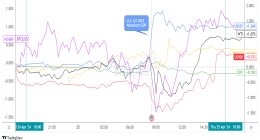
After correcting for inaccuracies, China’s standing in the World Bank’s 2017 Doing Business report would drop from No. 78 to 85.
Photo: Associated Press
WASHINGTON—World Bank management pressured staff members to manipulate data used in its flagship report on business competitiveness, resulting in improvements in China’s and Saudi Arabia’s global rankings, the bank said after an internal investigation.
The bank on Wednesday released the outcome of its audit, which it opened this year after employees raised concerns through an internal survey about the integrity of data in the annual Doing Business report. The bank said in August it was investigating irregularities affecting data for four countries: China, Azerbaijan, Saudi Arabia and the United Arab Emirates. The manipulated data were used in the 2017 report for China and in the 2019 report for the other three countries.
The Doing Business report has become a premier international ranking of countries’ business environments, motivating governments around the world to jockey for higher positions to attract foreign businesses. The rankings are based on measures such as the ease of starting a business, tax policies and access to credit. In the latest report, issued last year, New Zealand is ranked No. 1 among 190 countries for ease of doing business.
The World Bank’s audit found that out of the 15 employees on the report’s production team, nine said they had been directly or indirectly pressured to manipulate data while preparing the reports issued in 2017 and 2019. The employees said they didn’t initially escalate their concerns about the pressure they encountered due to fear of retaliation, according to the audit report.
After correcting for irregularities, for example, China’s global ranking in the report issued in October 2017 would decline seven points to No. 85 from the 78th slot it was awarded initially.
The Chinese embassy in Washington didn’t respond to a request for comment.
“Pressure from stakeholders as part of the DB report production and publication process has not been effectively managed,” the audit report said. “The lack of a safe speak-up environment within the DB team led to a fear of retaliation for those who would escalate and report pressures to manipulate data.” The report didn’t say who the stakeholders were.
The audit report also said the bank’s management had neither emphasized the importance of data integrity nor committed explicitly to addressing staff concerns about data manipulation. Frequent personnel changes within the management ranks and the absence of defined roles and responsibilities also made it difficult for employees to report such pressures.
The bank’s investigation found that after adjusting for the irregularities, Saudi Arabia’s ranking in the 2019 report would fall from 62 to 63, while Azerbaijan’s position would rise from 34 to 28. The United Arab Emirates’ ranking would remain unchanged at 18 in the 2019 report.
The embassies for Saudi Arabia, Azerbaijan and the UAE couldn’t immediately be reached for comment.
The World Bank said it would incorporate the data that reflects the latest findings in its next report to be issued in the coming months.
Concerns raised through an employee engagement survey in April 2020 triggered the probe. That followed 2018 remarks by the World Bank’s former chief economist, Paul Romer, who said the data in the report was susceptible to manipulation and expressed concern about the potential for political motivations behind the shifting rankings.
In the latest report, the World Bank outlined its management’s plan to improve data integrity. Those measures include conducting an annual training program and enhancing protocols to increase the transparency of the report’s production process to “reduce opportunities for undue influence by external and internal stakeholders.” Bank management will also strengthen the controls over data changes by staff members during the production process.
The bank also said it is launching an external review of the Doing Business methodology to strengthen the product and its usefulness.
Write to Yuka Hayashi at [email protected]
Copyright ©2020 Dow Jones & Company, Inc. All Rights Reserved. 87990cbe856818d5eddac44c7b1cdeb8
Appeared in the December 18, 2020, print edition as ‘World Bank’s Nation Rankings Fudged.’









